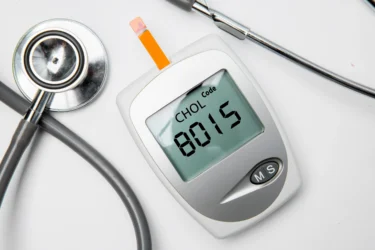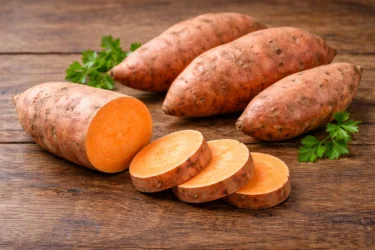Sweet Potatoes (Shakarkandi): Uses, Benefits, Side Effects By Dr. Smita Barode
By Dr Smita Barode +2 more

Get,

to manage your symptom
Get your,


4 Cr+ families
benefitted

OTP sent to 9988776655



You’ve successfully subscribed to receive
doctor-approved tips on
Whatsapp

Get ready to feel your best.

Hi There,
Download the PharmEasy App now!!


Register to Avail the Offer
Send OTPBy continuing, you agree with our Privacy Policy and Terms and Conditions

Hi There,
Sign up on PharmEasy now!!
Trusted by 4 crore+ families

OTP sent to 9988776655



You have unlocked 25% off on medicines




Code: NU25
By Dr Smita Barode +2 more
Table of Contents
Since ancient times, sweet potatoes have been a staple food worldwide. Sweet potato or Ipomoea batatas is an edible root of the morning glory family (Convolvulaceae), whereas potatoes are edible tubers of the nightshade family (Solanaceae). Sweet potatoes originated in South America, from where they spread to warm-temperate regions worldwide. In India, sweet potatoes were introduced by the Spanish. They are locally known as ‘shakarkandi’ and are growing at a large scale in Bihar, West Bengal, Uttar Pradesh and Andhra Pradesh. The most common variety of sweet potatoes has copper-coloured skin and vibrant orange flesh. Other varieties are yellow, white, deep purple and cream. True to their name, sweet potatoes are naturally sweet in flavour. These are cooked, roasted or diced into soups and salads. Apart from culinary uses, the health benefits of sweet potatoes are innumerable. Let us learn more about sweet potatoes benefits and side effects and why you should add sweet potatoes to your diet for a sweet and healthy life1,3.

Sweet potatoes are rich in dietary fibre, minerals and vitamins. The most important ones include beta-carotene, Vitamins B2, C and E, and antioxidants like beta-carotene, etc. The nutrients in sweet potatoes are mentioned below.
Scientifically proven properties of Ipomoea batatas include:
Some of the potential benefits of sweet potatoes are described as under:

Colorectal cancer is a commonly diagnosed cancer in both men and women. Peng-Gao et al. conducted a study in 2013 to assess the impact of sweet potatoes on colorectal cancer. The study6 results show that sweet potatoes may have the potential to suppress cell growth (anti-proliferative effect) and inhibit the spread of cancer to other parts of the body (anti-metastatic effect). The anti-cancer mechanism is attributed to the presence of sweet potato protein (SPP). This indicates that consuming sweet potatoes may help with colorectal cancer. However, as scientific evidence supporting this claim is limited, there is a need for conducting further research.

Abnormal lipid levels are characterised by an elevation in plasma cholesterol, low-density lipoprotein and a reduction in high-density lipoprotein. A review done by Naomi et al. in 2021 suggests that the flavonoids in sweet potatoes reduce fat absorption by regulating enzymes that are involved in the metabolism of lipids. Through this mechanism, flavonoids decrease the total cholesterol and low-density lipoprotein levels and increase the high-density lipoprotein levels7. This indicates that the consumption of sweet potatoes can help normalize lipid levels. However, we need more studies to support these claims.

Neurodegenerative diseases are diseases characterised by the gradual degeneration of neurons, which are the functional units of the nervous system. Alzheimer’s disease, Parkinson’s disease and spinal muscular atrophy are a few examples of neurodegenerative diseases. Oxidative stress is the main cause of the development of these diseases. Shan et al. conducted a review in 2009, mentioning that anthocyanins in sweet potatoes have antioxidant and anti-inflammatory properties, which can exert neuroprotective effects. This suggests that consuming sweet potatoes may help manage neurodegenerative diseases. However, scientific evidence supporting these claims is limited, and this warrants the need for more clinical studies to support these claims8.

Sweet potatoes have been used in traditional medicine for managing Type II diabetes. However, Li et al., through animal studies done in 2009, demonstrated the blood-glucose-lowering effect of sweet potatoes. Additionally, they have a low glycemic index which causes a slow release of glucose into the blood; this steady phase helps control elevated blood glucose. A trial done by Cheow et al. in 2013 showed that 122 participants supplemented with sweet potatoes showed a moderate reduction in HbA1c, which is an indicator of glycemic control and shows average blood glucose level of the past two to three months. This indicates that sweet potatoes may have the potential to manage diabetes, but we need more scientific evidence to support these claims9.

Caffeic acid, a polyphenolic compound, is abundant in many fruits and vegetables and is known for its anti-inflammatory and anti-oxidant effects in colitis. After reaching a relevant concentration in the colon, it comes in contact with the intestinal cells and exerts an anti-inflammatory effect. Sweet potatoes are also rich in caffeic acid and thus may have the potential to manage colitis. However, no scientific data is available for this, and thus more studies should be conducted to ascertain these claims10,11.

Though there are studies that show the benefits of sweet potatoes in various conditions, these are insufficient and there is a need for further studies to establish the true extent of the benefits of sweet potatoes on human health.
Sweet potatoes are a rich source of beta-carotene. Beta-carotene is carotenoid and antioxidant which is highly useful for maintaining vision and overall eye health. Additionally, sweet potatoes are rich in vitamins like vitamins C and E. These vitamins might avoid or delay cataract development and macular degeneration13.
Dr. Siddharth Gupta, B.A.M.S, M.D (Ayu)
You must consult a qualified doctor before taking any herbal supplements. Do not discontinue or replace an ongoing treatment of modern medicine with an ayurvedic/herbal preparation without consulting a qualified doctor.
A few side effects related to the consumption of sweet potatoes include:
However, if you experience any adverse reactions to sweet potatoes, it is advised to discontinue its intake and immediately contact a doctor or your Ayurvedic physician who has prescribed it. They will be able to guide you appropriately for your symptoms.
Sweet potatoes are highly nutritious and often called a superfood. They are good sources of fibre and vitamins like A, C, B3, B5, and B6 which might be useful in maintaining digestive health, strengthening immunity and improving brain function. They might also contribute to better bone health because of the richness of minerals like manganese, copper, and potassium14.
Dr. Rajeev Singh, BAMS
Eating sweet potato is okay if taken in moderate amounts. However, general precautions must be taken in the following conditions:
There is no significant interaction of sweet potatoes with other drugs. However, you must always seek the advice of your Ayurvedic physician about the possible interaction of sweet potatoes with other drugs and follow the prescription thoroughly, as they will know your health condition and other medications you are taking.
Also Read: Potato (Aloo): Uses, Benefits, Side Effects and More!
The scientific name of sweet potato is Ipomoea batatas1.
Sweet potato or Ipomoea batatas is an edible root of the morning glory family (Convolvulaceae), whereas potatoes are edible tubers of the nightshade family (Solanaceae)1.
Yes, sweet potatoes may help manage constipation; this effect is attributed to the high content of dietary fibre in them. However, more studies are needed to support these claims. Therefore, it is advised to consult a doctor for proper treatment in case you have constipation7.
Sweet potatoes are rich in the antioxidant beta-carotene, which is converted to Vitamin A in the body. Vitamin A is responsible for the formation of light-detecting receptors in the eyes. An increase in the quality and number of the light-detecting receptors helps in better vision. Thus, sweet potatoes may help improve vision. However, scientific evidence in support of this is limited and we need more studies to ensure these claims. It is recommended to consult a doctor for proper treatment in case you have any vision-related issues1.
There have been a few instances of anaphylaxis (severe allergic reaction) after the consumption of sweet potatoes. Consumption in excess can also result in kidney stones, stomach pain, bloating, diarrhoea, etc12.
Disclaimer: The information provided here is for educational/awareness purposes only and is not intended to be a substitute for medical treatment by a healthcare professional and should not be relied upon to diagnose or treat any medical condition. The reader should consult a registered medical practitioner to determine the appropriateness of the information and before consuming any medication. PharmEasy does not provide any guarantee or warranty (express or implied) regarding the accuracy, adequacy, completeness, legality, reliability or usefulness of the information; and disclaims any liability arising thereof.
Links and product recommendations in the information provided here are advertisements of third-party products available on the website. PharmEasy does not make any representation on the accuracy or suitability of such products/services. Advertisements do not influence the editorial decisions or content. The information in this blog is subject to change without notice. The authors and administrators reserve the right to modify, add, or remove content without notification. It is your responsibility to review this disclaimer regularly for any changes.
Comments

Leave your comment...
You may also like
Comments